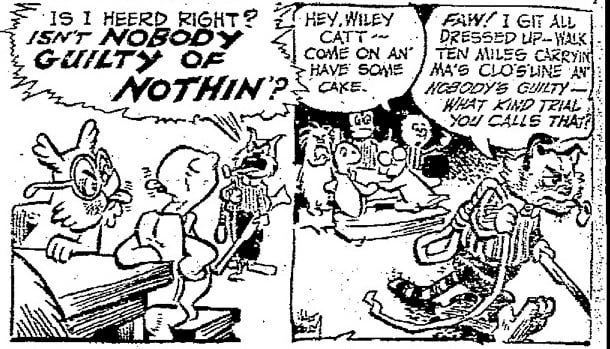Jury Duty, ’50s Style
Cable news coverage of high-profile verdicts frequently sort of put me in mind of the above strip (from the end of a 1950 Pogo arc – hopefully soon to be reprinted by Fantagraphics – about the trial of Albert Alligator for allegedly eating a cute puppy). But it also put me in mind of Twelve Angry Men, because that’s the go-to reference for anything involving juries. (Maybe someone should produce a sequel about the reaction to that jury’s verdict.) But it led me to seek out the original version of Twelve Angry Men, the 1954 live television play written by Reginald Rose and directed by Franklin Schaffner (Patton).
Share
Cable news coverage of high-profile verdicts frequently sort of put me in mind of the above strip (from the end of a 1950 Pogo arc – hopefully soon to be reprinted by Fantagraphics – about the trial of Albert Alligator for allegedly eating a cute puppy). But it also put me in mind of Twelve Angry Men, because that’s the go-to reference for anything involving juries. (Maybe someone should produce a sequel about the reaction to that jury’s verdict.) But it led me to seek out the original version of Twelve Angry Men, the 1954 live television play written by Reginald Rose and directed by Franklin Schaffner (Patton).
Rose expanded the play for the film version, and that script is more satisfying because it used the extra half-hour to flesh everything out; a lot of this version feels, inevitably, rushed by comparison. But most of the familiar bits are already here, as is the old-school liberal attitude about crime and punishment, a familiar part of ’50s and ’60s TV (though not Dragnet) but not common today. What I like about this original version may actually be a result of miscasting. The star is Robert Cummings, a star of light film comedies and sitcoms with not much live performance experience. He seems nervous (whether because of the live TV or because he’s directed that way, who knows) and not quite comfortable. Which actually works better for me than Henry Fonda’s casting in the film, because that guy is an out-and-out hero, better than everyone in the room. The juror # 8 here seems more like a regular person, a bit nervous about bringing up his doubts and going against the crowd, who gains confidence as it goes on.
Watching ’50s live TV drama – this, and the work of Sidney Lumet (who directed the film version, though not this one) is a reminder that live drama had a visual energy that filmed drama didn’t have, and wouldn’t have for quite a while. In fact, this is an era of TV that truly influenced feature films: not only did a lot of the better live drama directors go into features, but a lot of the techniques they used to make live TV more visually interesting – like panning the camera around someone as he speaks, or having him walk into extreme close-up – became more a bigger part features than they had been before.
The “Twelve Angry Men” story has become a big part of TV comedy, too, since so many comedies do a jury duty episode. Probably my favourite episode of that type is actually called “Twelve Angry Men,” from Hancock’s Half-Hour. It’s sort of a direct parody of the film version, since it replaces the good liberal humanist hero with a juror (Tony Hancock) who is a complete idiot, trying to acquit an obviously guilty person for no good reason, but who acts like he’s convinced that he is a crusading hero. It’s not just British sitcoms that do this, of course, but it does seem to be particularly popular in UK sitcoms to have the central character be someone who tries to act as if he or she is in some other type of story: David Brent is a recent example of the type.
http://www.youtube.com/watch?v=ejHKA2HI4TY
